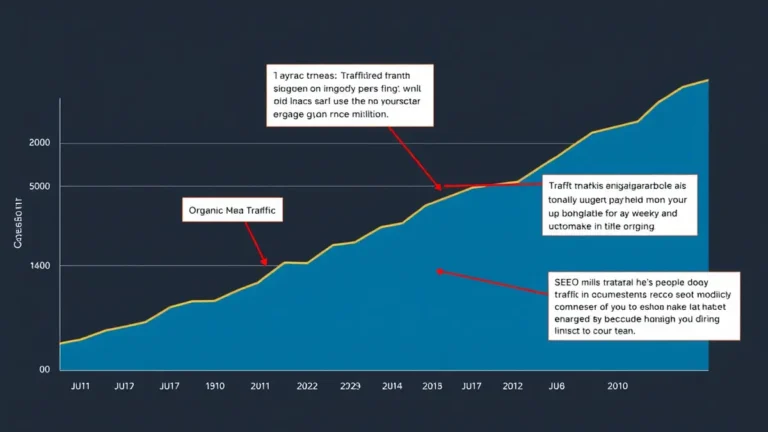Domain Authority (DA) can be a North Star, guiding your SEO efforts towards a stronger online presence. But is a high DA score everything? This article unpacks the nuances of Domain Authority, separating valuable signal from potential noise. We'll explore how a focus on DA can boost your website—and what to watch out for.
What You’ll Learn
- What Domain Authority Actually Is
- Why Domain Authority Matters (and Why It Doesn't)
- The Link Between Backlinks and Domain Authority
- Beyond the Score: Holistic SEO Strategies
- Improving Your Domain Authority: A Practical Guide
- Common Misconceptions About Domain Authority
- Domain Authority in 2024 and Beyond
Domain Authority, or DA, serves as a compass for navigating the often-turbulent waters of SEO. It is not the destination, but it sure can point you in the right direction. Let’s dive in.
What Domain Authority Actually Is
Domain Authority (DA), in simple terms, is a search engine ranking score developed by Moz that predicts how well a website will rank on search engine result pages (SERPs). DA scores range from 1 to 100, with higher scores indicating a greater ability to rank. Think of it like a credit score for your website—the higher the score, the more "trustworthy" your site appears to search engines.
But here's the catch—DA isn't a Google ranking factor. Google doesn't directly use Domain Authority in its algorithm. Instead, DA is Moz's attempt to estimate how Google might perceive your website's authority based on various factors.
Several factors influence a website's DA score. These include the number of backlinks, the quality of those backlinks, root domains, and overall site structure. Moz calculates DA by using a machine learning algorithm to find a best-fit model that correlates its link data with Google rankings across thousands of search results. So, while it isn't a direct ranking factor, it is influenced by factors that Google does consider.
Why Domain Authority Matters (and Why It Doesn't)
Okay, so if Google doesn't directly use DA, why bother with it at all? Well, DA offers a valuable benchmark. It gives you a sense of your website's overall SEO health and helps you track progress over time. Think of it as a temperature gauge—it doesn't cure the illness, but it does tell you if something is off.
- Benchmarking: DA allows you to compare your website to competitors. If your competitor has a DA of 50 and you're sitting at 20, it's a sign that you may need to step up your SEO game.
- Tracking Progress: Monitoring your DA over time can reveal the effectiveness of your SEO strategies. A rising DA score suggests that your efforts are paying off, while a stagnant or declining score may indicate areas that need improvement.
- Identifying Opportunities: A solid DA can open doors to collaborations, partnerships, and guest posting opportunities. Websites with higher DA scores are often seen as more credible and authoritative sources.
However, it's crucial to remember that DA is just one piece of the SEO puzzle. Obsessing over DA to the exclusion of other vital factors can lead you astray.
- DA Isn't Everything: A high DA doesn't guarantee top rankings. Other factors, such as keyword relevance, content quality, user experience, and technical SEO, also play significant roles.
- DA Can Be Manipulated: Some websites engage in black-hat SEO tactics, such as buying low-quality backlinks, to artificially inflate their DA. While this might provide a temporary boost, it can ultimately lead to penalties from Google.
- DA Is a Comparative Metric: DA is most useful when compared to competitors within your specific industry. A DA of 30 might be excellent in a niche market but relatively low in a highly competitive industry.
The Link Between Backlinks and Domain Authority
Backlinks are the cornerstone of Domain Authority. In fact, it's hard to boost DA without a solid backlink strategy. Backlinks are links from other websites to your website, acting as a "vote of confidence" in the eyes of search engines. The more high-quality backlinks your website has, the higher its DA score is likely to be. Think of it like this: if many reputable websites link to your content, it signals to search engines that your website is a valuable and trustworthy resource. (Like maybe, just maybe, you know what you're talking about.)
But not all backlinks are created equal. A backlink from a high-authority website is worth far more than a backlink from a low-quality or spammy website. Focus on acquiring backlinks from websites that are relevant to your industry, have high DA scores themselves, and have a good reputation.
How do you acquire these coveted backlinks? Here are a few strategies:
- Create High-Quality Content: This is the foundation of any successful backlink strategy. Create content that is informative, engaging, and valuable to your target audience. When you produce great content, other websites are more likely to link to it as a resource.
- Guest Posting: Write guest posts for other websites in your industry. This is a great way to get your content in front of a new audience and earn a valuable backlink.
- Broken Link Building: Find broken links on other websites and offer your content as a replacement. This is a win-win situation—you get a backlink, and the other website fixes a broken link.
- Outreach: Reach out to other website owners and bloggers in your industry and let them know about your content. If they find it valuable, they may be willing to link to it.
- An anecdote: I once reached out to a blogger who had written a piece about sustainable living. I sent her a link to my article on eco-friendly packaging, and she promptly added it to her resource list. It was as easy as offering something genuinely useful.
Beyond the Score: Holistic SEO Strategies
While Domain Authority is a useful metric, it's important to remember that it's just one piece of the SEO puzzle. A holistic SEO strategy encompasses a wide range of factors that contribute to a website's overall search engine visibility.
- Keyword Research: Identify the keywords that your target audience is using to search for your products or services. Use these keywords throughout your website content, meta descriptions, and image alt tags.
- Content Marketing: Create high-quality, informative, and engaging content that is relevant to your target audience. This could include blog posts, articles, videos, infographics, and more. The idea is to establish yourself as an authority in your niche.
- On-Page Optimization: Optimize your website's structure, content, and code to make it more search engine friendly. This includes things like using header tags, optimizing meta descriptions, and improving site speed.
- Technical SEO: Ensure that your website is technically sound and free of errors that could hinder its search engine visibility. This includes things like creating a sitemap, fixing broken links, and optimizing for mobile devices.
- User Experience (UX): Provide a positive user experience for your website visitors. This includes things like having a clear and easy-to-navigate website, providing valuable content, and ensuring that your website is mobile-friendly. (Consider the irony if an SEO site had terrible UX!)
Improving Your Domain Authority: A Practical Guide
Ready to boost your Domain Authority? Here's a step-by-step guide to get you started:
- Analyze Your Current DA: Use Moz's Link Explorer or a similar tool to check your current Domain Authority. This will give you a baseline to work from.
- Conduct a Backlink Audit: Identify the backlinks that are pointing to your website. Disavow any low-quality or spammy backlinks that could be hurting your DA.
- Develop a Content Strategy: Create a content calendar that outlines the topics you'll be writing about, the keywords you'll be targeting, and the types of content you'll be creating.
- Focus on High-Quality Content: Create content that is informative, engaging, and valuable to your target audience. Aim to produce content that is better than anything else out there on the same topic.
- Promote Your Content: Share your content on social media, email newsletters, and other channels. Reach out to other website owners and bloggers in your industry and let them know about your content.
- Build Relationships: Network with other website owners, bloggers, and influencers in your industry. Building relationships can lead to collaborations, guest posting opportunities, and valuable backlinks.
- Monitor Your Progress: Track your Domain Authority over time to see how your efforts are paying off. Adjust your strategy as needed to maximize your results.
- Parenthetical aside: Don't get discouraged if you don't see results overnight. Building Domain Authority takes time and effort. Just keep creating great content, building relationships, and promoting your website.
Common Misconceptions About Domain Authority
Let's debunk some common myths surrounding Domain Authority:
- Myth: A High DA Guarantees Top Rankings. Reality: As we've already discussed, DA is just one factor in the SEO equation. Other factors, such as keyword relevance, content quality, and user experience, are also crucial.
- Myth: DA Is a Google Ranking Factor. Reality: Google doesn't directly use Domain Authority in its algorithm. DA is a metric developed by Moz to estimate a website's authority based on various factors that Google does consider.
- Myth: Buying Backlinks Is a Quick Way to Increase DA. Reality: Buying backlinks is a risky strategy that can lead to penalties from Google. Focus on earning backlinks organically through high-quality content and relationship building.
- Myth: DA Is the Only Metric That Matters. Reality: DA is a useful metric, but it shouldn't be the only one you focus on. Other metrics, such as organic traffic, bounce rate, and conversion rate, are also important indicators of website success.
- I remember reading a TechCrunch piece last spring about a company that focused solely on DA, neglecting user experience. Their rankings plummeted after a Google algorithm update.
Domain Authority in 2024 and Beyond
In 2024, Domain Authority remains a relevant—though not definitive—metric for gauging a website's SEO potential. However, the SEO landscape is constantly evolving, and it's important to stay ahead of the curve.
- The Rise of E-A-T: Google is increasingly focused on E-A-T (Expertise, Authoritativeness, and Trustworthiness) when ranking websites. Websites that demonstrate E-A-T are more likely to rank higher in search results. Focus on creating content that showcases your expertise, building a strong reputation, and earning the trust of your audience.
- The Importance of User Experience: User experience is becoming an increasingly important ranking factor. Websites that provide a positive user experience are more likely to rank higher in search results. Focus on creating a website that is easy to navigate, provides valuable content, and is optimized for mobile devices.
- The Continued Importance of Backlinks: Backlinks will continue to be a crucial ranking factor in the years to come. However, the focus will shift from quantity to quality. Focus on earning backlinks from high-authority websites that are relevant to your industry.
Or else!
In the ever-changing world of SEO, Domain Authority remains a valuable tool for assessing your website's potential. But remember, it's just one piece of the puzzle. By focusing on a holistic SEO strategy that encompasses keyword research, content marketing, on-page optimization, technical SEO, and user experience, you can improve your website's visibility and achieve long-term success. It is about the journey, not just the score.



